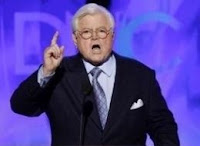 Israel and U.S. Jews on Wednesday expressed sorrow over the passing of Senator Edward M. Kennedy who died at age 77 on Tuesday night following a battle with cancer.
Israel and U.S. Jews on Wednesday expressed sorrow over the passing of Senator Edward M. Kennedy who died at age 77 on Tuesday night following a battle with cancer.
In tribute to the late senator, President Shimon Peres said Kennedy was a particularly respected leader with an interest in helping society, and added that his death was a great loss for every thoughtful person in the world.
"Kennedy was a clear friend of Israel the whole way, and in every place that he could help us he did help," he added.
The UJC/ Jewish Federations of North America, a leading Jewish advocacy and charitable organization, called Kennedy's death "a loss for the Jewish people and our nation."
William C. Daroff, vice president for public policy and director of the UJC/The Jewish Federation of North America's Washington office, released a statement terming Senator Kennedy a 'good friend' to the Jewish community worldwide:
The United States not only lost a senator, but a friend to the most vulnerable and disenfranchised," said the statement, |UJC was fortunate to have a close relationship with Senator Kennedy and was honored to be asked to represent the faith community in his long-term care advocacy efforts."
"He was a good friend to the Jewish Federation system and the Jewish people worldwide, including Soviet Jewry and the State of Israel."
Foreign Minister Avigdor Lieberman also expressed his condolences, calling Kennedy a great friend of Israel and the Jewish people.
He added that Kennedy protected human rights, and was the son of a distinguished family who stood by Israel, even in difficult times, during his many years of service in the Senate.
Kennedy reflected the deep ties shared between Israel and the U.S., Lieberman said.
Kennedy, a major figure in the Democratic Party who took the helm of one of America's most fabled political families after two older brothers were assassinated, died late Tuesday.
"Edward M. Kennedy, the husband, father, grandfather, brother and uncle we loved so deeply, died late Tuesday night at home in Hyannis Port (Massachusetts)," the Kennedy family said in a statement.
One of the most influential and longest-serving senators in U.S. history - a liberal standard-bearer who was also known as a consummate congressional dealmaker - Kennedy had been battling brain cancer, which was diagnosed in May 2008.
"We've lost the irreplaceable center of our family and joyous light in our lives, but the inspiration of his faith, optimism, and perseverance will live on in our hearts forever," the family statement added.
His death marked the twilight of a political dynasty, and dealt a blow to Democrats as they seek to answer U.S. President Barack Obama's call for an overhaul of the healthcare system. Kennedy had made healthcare reform his signature cause.
Known as "Teddy," he was the last of four sons and five daughters born to millionaire businessman Joseph Kennedy, who would later be ambassador to Britain, and his wife Rose.
He was the brother of President John Kennedy, assassinated in 1963, Senator Robert Kennedy, fatally shot while campaigning for the 1968 Democratic presidential nomination, and Joe Kennedy, a pilot killed in World War II.
Robert Kennedy was assassinated by a 24-year-old Palestinian immigrant named Sirhan Sirhan, who remains in prison for the crime to this day. Sirhan testified at his trial that he began to hate Robert Kennedy after learning of the latter's support for Israel.
Edward Kennedy was elected to the Senate in 1962, when his brother John was president, and served longer than all but two senators in history.
After Robert Kennedy's death, Edward was expected to waste little time in vying for the presidency. But in 1969, a young woman drowned after a car Kennedy was driving plunged off a bridge on the Massachusetts resort island of Chappaquiddick after a night of partying.
Kennedy's image took a major hit after it emerged he had failed to report the accident to authorities. He pleaded guilty to leaving the scene and received a suspended sentence.
Kennedy eventually ran for his party's presidential nomination in 1980 but lost to then-President Jimmy Carter.
His presidential ambitions thwarted, Kennedy devoted himself to his Senate career.
During his nearly half century in the chamber, Kennedy became known as one of Washington's most effective senators, crafting legislation by working with lawmakers and presidents of both parties, and finding unlikely allies.
At the same time, he held fast to liberal causes deemed anachronistic by the centrist "New Democrats," and was a lightning rod for conservative ire.
He helped enact measures to protect civil and labor rights, expand healthcare, upgrade schools, increase student aid and contain the spread of nuclear weapons.
Kennedy's illness kept him from attending the funeral of his sister, Eunice Kennedy Shriver, a leading advocate of the metally disabled, who died on Aug. 11 at the age of 88.
http://www.haaretz.com/hasen/spages/1110231.html
Wednesday, 26 August 2009
U.S. Jews: Ted Kennedy's death is a loss for the Jewish people
Posted @
17:31
![]()
Post Title: U.S. Jews: Ted Kennedy's death is a loss for the Jewish people
Subscribe to:
Post Comments (Atom)
![[9_10_s22.jpg]](https://blogger.googleusercontent.com/img/b/R29vZ2xl/AVvXsEjTXnQay9wzz0E6nVHrVhaHKoq_zYXDqZjijHlNDQzj90MZzInrCuVX4ciFYCiBfZ7lhlgr2bBhhnl7ddWbhdih5JbXjQYbA605TNyiq046bQqjG2A4S-nHTmh1VBTQSG6tmc23wq47QQ/s1600/9_10_s22.jpg)




1 comment:
A communist sleeper?
Post a Comment